ABOUT US
BODY IMAGE THERAPY works in close alignment with the cosmetic surgery industry to:
- Protect surgeons from the risk of complaint and assist in upholding ethical standards.
- Protect patient’s psychological health and help cosmetic surgery have a positive impact on people’s lives.

Hi there! I’m Gina, a Cognitive Behavioural Therapist (CBT) passionate about helping people develop a healthy relationship with themselves. I’m accredited with the BABCP and have worked extensively in the NHS, providing CBT therapy for a wide range of mental health concerns. I understand the complex relationship we have with our bodies and how it can impact our well-being. I work with clients to develop a healthy body image and challenge negative self-perceptions.
I am particularly interested in the psychological aspects of cosmetic surgery. I help clients explore their motivations, manage expectations, and ensure emotional readiness for procedures.
I offer CBT therapy for a variety of mental health concerns, including anxiety, depression, and low self esteem. My approach is collaborative and evidence based, empowering clients to develop effective coping mechanisms.
Just like I help you find balance in your life, I prioritize maintaining a healthy work-life balance for myself. Yoga and Pilates help me unwind, while creating a beautiful home environment sparks my creativity. For a different kind of challenge, I enjoy playing padel tennis. Outside of this, you’ll likely find me exploring the scenic moors with my doodle dogs or enjoying good company with family and friends.

Get to Know More About us
Cosmetic surgery and mental health are closely linked, therefore cosmetic surgeons encounter patients with psychological disorders at a high frequency positioning them at higher risk of complaints.
Patients with body dysmorphic disorder or eating disorders often view cosmetic surgery as a quick fix to a psychological problem. Often, they are dissatisfied with the outcome. Other mental health issues such as anxiety and depression can be triggered or worsened by pre-surgery nerves, post-recovery time, possible complications or their psycho-social expectations not being met.
NICE guidelines recommend that cosmetic surgeons refer patients who they have psychological concern for to an experienced mental health professional. Our service assesses patient’s psychological readiness for cosmetic surgery.
“let’s work together
We provide an in-depth Cosmetic
Readiness Assessment and a simple referral pathway for individuals who require pre/post surgery psychological support. Within 48 hours of the assessment, we provide a comprehensive psychological report to both the surgeon and the patient on psychological readiness for surgery.
– Gina
get inspired

